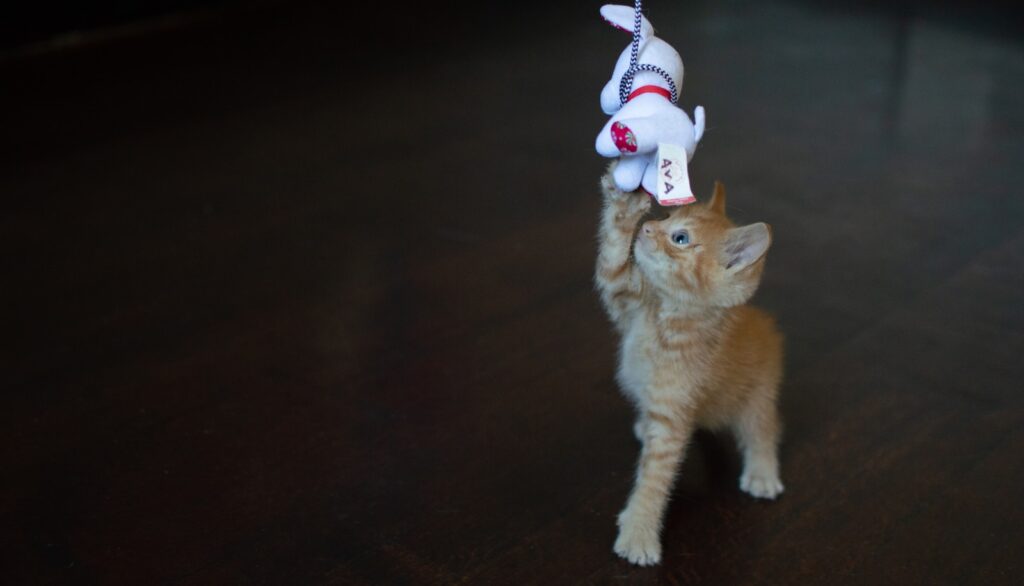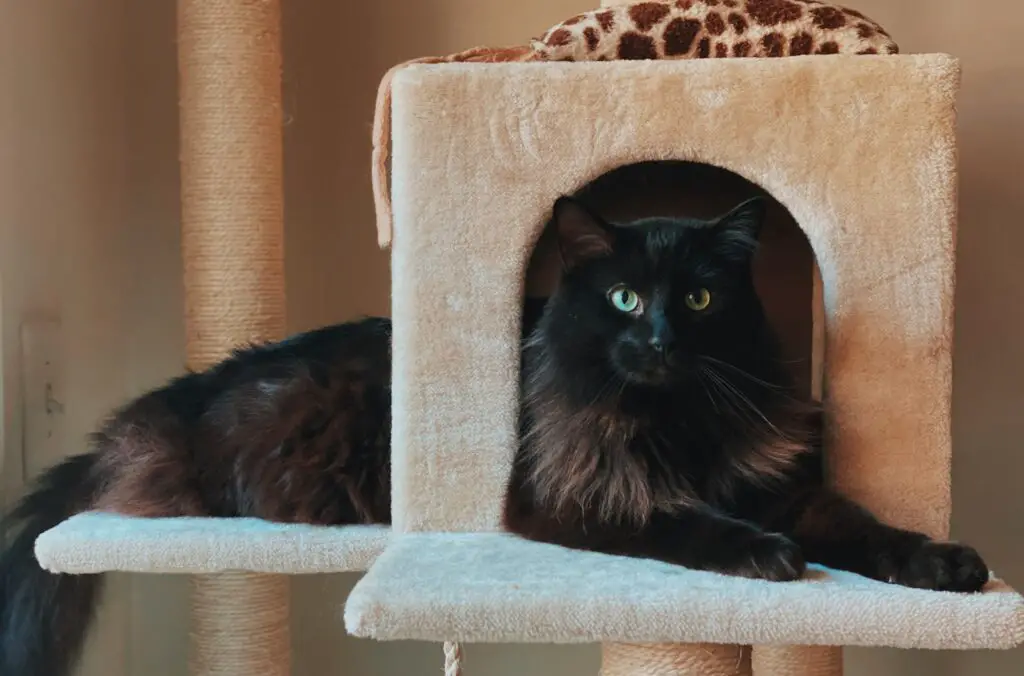
Key points
- Older cats tend to face different age-associated disorders, and one of these is cognitive dysfunction syndrome or dementia. This condition affects a feline’s cognitive functions and is connected with brain aging.
- The symptoms of cat dementia include disorientation, alterations in the sleep-wake cycle, changes in interactions with others, house soiling, and changes in the activity level.
- The condition is irreversible, but if you stay determined to provide your cat with a healthy and balanced diet, you can slow down the progression of dementia and decrease your cat’s discomfort.
- A proper diet for cats with dementia should include a lot of antioxidants, vitamins E and C, and fats such as Omega-3. Switching your cat to an insect protein diet may also be beneficial, as it contributes to healthy cognition.
 Domestic cats have a longer life expectancy than wild cats, which gives us as pet owners more years to enjoy our furry friends. But unfortunately, this increased longevity can be marred by many age-associated disorders and complications.
Domestic cats have a longer life expectancy than wild cats, which gives us as pet owners more years to enjoy our furry friends. But unfortunately, this increased longevity can be marred by many age-associated disorders and complications.
Cat dementia or cognitive dysfunction syndrome (CDS) is a degenerative process in a cat’s brain that decreases cognitive function. This condition affects senior cats, and it is directly connected to brain aging. This condition makes it harder for your pet to learn and memorize things, lowers their awareness, and makes their responses to different stimuli slower. CDS itself has no severe symptoms in the early stages, but it tends to get worse over time, which is known as “cognitive decline”.
Table of Contents
Types Of Feline Dementia and Its Symptoms
The cognitive dysfunction syndrome develops slowly, and its symptoms are not always distinguishable in the early stages of the condition. However, behavioral symptoms of cat dementia are easier to notice. You can memorize them using the DISHA acronym:
- Disorientation (your cat may get trapped in corners or forget the location of its food bowl or litter tray);
- [changes in] Interactions with others (unusual aggressiveness or attention-seeking behavior);
- Sleep-wake cycle alterations (being awake during the times when the cat would typically sleep in the past);
- House soiling;
- Activity level changes.
It’s much easier to identify these symptoms in cats that are 10 years old or older. DISHA symptoms can be more distinct, with your cat experiencing confusion, extreme irritability, loss of appetite, anxiety, restlessness, excessive licking or lack of self-grooming, decreased desire to play, inability to follow familiar routes, changes in the sleep cycle, fecal and urinary incontinence, and increased vocalization. Your feline may also struggle to learn new tasks and show disregard for previously learned training or house rules.
What Causes Dementia In Cats?
Unfortunately, the original root of feline dementia has not been found yet, but felines can have a genetic predisposition to this condition. One study has discovered that about one-third of cats between the ages of 11 and 14 show at least one behavioral symptom related to CDS. This percentage increases to about 50% in cats older than 15.
Can I Prevent My Cat From Developing Dementia?
Mammalian brains have the power of neuroplasticity, meaning they can change and adapt to the environment. That’s why you shouldn’t neglect daily cognitive activities for your cat, as these can delay degenerative neurological processes or slow down their progress. It is important to incorporate environmental enrichment not only after your cat has faced the disease but also throughout its whole life. It’s never a bad idea to play some cognitive games with your pet, whether it suffers from CDS or not.
When choosing activities for your pet, look at what it likes most while considering other health issues your cat may experience. This is especially useful if you have an indoor pet, as there’s a great variety of game options for cats that cater to their natural chasing instincts.
How To Diagnose Cognitive Dysfunction Syndrome in Felines?
If you keep a record of all of your cat’s abnormal behaviors, it’ll be easier for your pet’s veterinarian to diagnose the condition. You should also tell the specialist your pet’s complete health history, describe when the onset of the condition occurred, and the possible incidents that could have impacted or caused it.
The veterinarian will perform a physical examination to see the pet’s overall health condition and evaluate your cat’s cognitive abilities. Your vet may also do blood work, X-rays, and ultrasounds to eliminate the risk of other diseases with similar behavioral symptoms, such as hyperthyroidism, diabetes mellitus, and chronic renal failure. It will be necessary for the professional to rule out any of these conditions first before diagnosing your cat with CDS.
CDS Treatment
Medication
If your cat is diagnosed with cognitive dysfunction syndrome, it’ll need life-long support and therapy, so it’s important for you to be dedicated to helping your pet. Even though medication can’t cure the condition, maintaining a healthy environment can slow down its progression. Your vet may prescribe different meds, including anxiolytic (anti-anxiety) drugs and antidepressants, to keep your cat calm and decrease its anxiety.
Calm Environment
If your cat develops a severe cognitive dysfunction syndrome (this is a stage at which the cat will show many symptoms of the disease), then you will need to minimize the environmental changes the pet experiences or even avoid them altogether. Cats with severe CDS become stressed very quickly, and it can worsen the symptoms even more. Providing your cat with a separate quiet room filled with crucial resources such as food, water, litter box, toys, etc., can be very beneficial.
Daily exercises and training will impact your cat’s cognition and severely slow down the disease. To avoid changing your cat’s environment, you should not move its bowls, bed, and litter trays from their usual spots. Having a consistent feeding schedule will help the pet to avoid confusion as well.
Here are some more tips that will help minimize the stress for your older cat:
- Don’t place your cat’s food and water bowls in places that are hard to access;
- If you elevate food and water bowls slightly from the floor, it’ll take less effort for the cat to reach them, especially if your pet suffers from arthritis;
- Consider getting bigger, low-sided litter trays;
- Fill the pet’s litter box with soft, sandy-type litter because it is much gentler on the paws;
- Make sure your cat’s bed is comfortable and easily accessible; getting a heated bed would be a great idea too;
- Avoid introducing a new cat or dog into your household, as it can be highly stressful for older cats.
Special Diet
Feeding your cat a well-balanced diet is crucial, whether your cat is healthy or suffers from adverse health conditions. Adding supplements such as Omega-3, vitamin E and C, flavonoids, selenium, carnitine, and carotenoids such as beta-carotene to your pet’s diet will go a long way to helping improve your cat’s cognition. Feeding your cat a proper diet will also contribute to its mental flexibility, awareness, comprehension, and learning skills.
Insect-Based Protein For Cats With Dementia
Switching to a natural hypoallergenic diet as an alternative to meat can also benefit your feline. Insect-based protein is a sustainable, low-calorie, and low-fat cat food option suitable for all cats. Studies show that insect-based cat diets promote brain health and improve cognition, which will be beneficial for cats that struggle with cognitive disorder syndrome. Despite its low caloric value, this food contains a lot of protein, iron, fiber, and calcium. A balanced, healthy diet will not only contribute to your feline’s general well-being but can also help alleviate the symptoms of CDS.
FAQ
How long can cats live with dementia?
The life expectancy of cats that suffer from dementia depends on the severity of the symptoms and the speed with which the disease progresses. A licensed veterinarian will be able to give you a life expectancy estimate after examining your cat.
Is a cat with dementia suffering?
It depends on the cat and how severe the symptoms are, as many pets can live comfortably for a long time after they’ve been diagnosed with dementia.
What to do with a cat that has dementia?
If your pet suffers from dementia, you should provide it with a calm and comfortable environment and feed your cat a healthy diet rich in fats, antioxidants, and vitamins.
How do you know if your senior cat has dementia?
If it’s difficult for your cat to navigate to similar places such as its food and water bowls or the pet seems confused and anxious, then it may be suffering from dementia.







